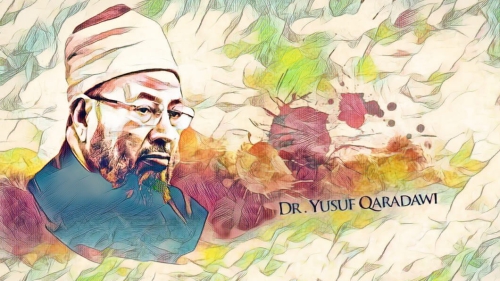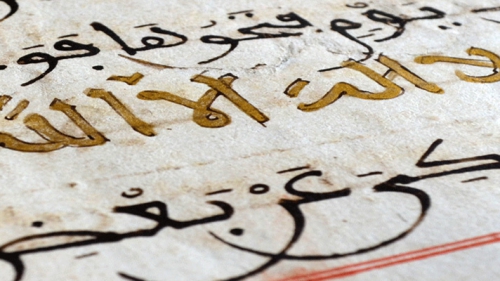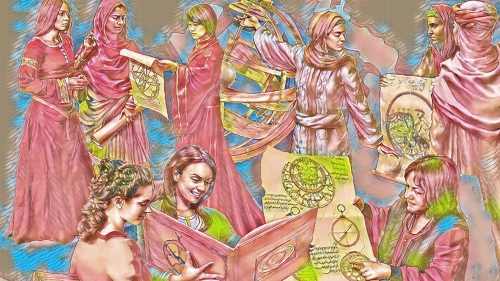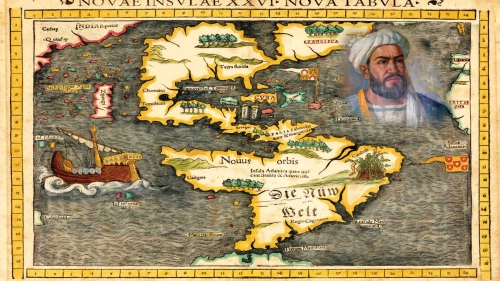Remembering Muslim Scholars: Jamal al-Din al-Afghani

Jamal al-Din al-Afghani was born in Asadabad, Iran, in 1838; he died in Istanbul, Turkey, on March 9, 1897. A philosopher and politician, he promoted the concept of unity of all Muslims against British rule in particular and against global western interests in general. His call for Muslim solidarity influenced Egypt's nationalist movement, Turkey's Tanzimat reforms, as well as Iran's constitutional and Islamic revolutions.
It is commonly agreed that Al-Afghani was born into a family of sayyids of Asadabad, Hamadan. Al-Afghani himself, however, claimed that he was born in the village of As'adabad, near Kabul, Afghanistan. Neither claim can be verified; the account of Afghani's childhood pieced together from the information provided by his biographer, Mirza Lutfullah Asadabadi, is sketchy at best. Later events in his life, however, indicate that he was educated at home until the age of ten. Thereafter he attended school in Qazvin and Tehran. During his teens, he studied theology and Islamic philosophy in Karbala and Najaf, centers of Shi'ite learning in Iraq.
In 1855, around the age of seventeen, al-Afghani traveled to India via the port of Brushehr, on the Persian Gulf. In India, he became acquainted with British imperialism and observed how Muslims were systematically discriminated against in receiving government appointments as well as in participating fully in religious and educational institutions. Indeed, the Muslims' struggle against British tyranny left an indelible impression on young al-Afghani. And increasingly he came to agree with the Indians who claimed that the British intended to undermine and discredit Islam. From India, al-Afghani traveled to Mecca before returning to Karbala and Najaf, centers at which he had studied earlier. He remained in Iraq until 1865, when he traveled to Iran and, the following year, to Afghanistan.
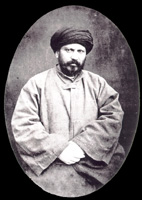
Documented reports of al-Afghani's residence in Afghanistan date to 1866, when he was part of the entourage of Muhammad A'zam Khan, the military ruler of Qandahar under Dost Muhammad Khan. When Dost Muhammad died in 1863, his three sons fought among themselves for the rulership. Amir Shir 'Ali Khan, Dost Muhammad's third son, assumed power in Kabul, pledging to modernize the nation. Shir 'Ali's brothers, however, rebelled in Qandahar and ousted him in 1866. A'zam became king, and al-Afghani became his close confidant. As part of his duties, al-Afghani reportedly drew up a national recovery plan for Afghanistan that included provisions for a network of schools, establishment of centralized government, institution of a national newspaper, and a well-regulated communication system. In politics, he advised the king to ally himself with Russia to prevent the steady northward movement of the British accross the Pujab. A'zam's rule, however, was short-lived. Shir 'Ali returned in 1868, deposed Muhammad A'zam and expelled al-Afghani--a foreigner who spoke dari with a farsi accent. He retained al-Afghani's modernizing reforms, however.
Al-Afghani was a clergyman with a strong constitution. He is reported to have had a magnetic personality and a dogged determination, both of which he used competently to penetrate exclusive circles in which he could promote his cause. And he cherished secrecy at the expense of social norms. He wore a white turban while calling himself a sayyid, and adamantly refused any association with women. He was quick-tempered, quick of action, and quick to envisage a British plot at every turn.
Afghanistan afforded al-Afghani a worthy education by supplementing his understanding of the dynamics of struggle against imperialism with a possible response. He came to realize that the Shi'i and Persian rational philosophy that had inspired him in India could be used to rid the Muslim masses of ignorance and poverty, especially if they were enhanced with armed struggle and savage confrontation. If Afghans with their bare hands could defeat the forces of Britain in the First Afghan War, he posed the question, what impact would the force of the total Muslim community under a charismatic ruler have on the West! Al-Afghani then made a point of injecting himself into the growing confrontation between the Muslim East and the Christian West.
The Muslim ruler charismatic enough to realize al-Afghani's secret aspiration was Abdulaziz, the Ottoman sultan. Forming a master plan, al-Afghani befriended the Ottoman Sultan from afar and, in 1869, traveled to Istanbul expecting to be named the Sultan's confidant. Turkish officials, steeped in the Tanzimat reforms, however, did not pay him the attention that he felt he deserved; they appointed him to a lesser position on the Council of Education. An opportunist, al-Afghani used the Council as a forum for the promotion of his ideas and delivered a series of inspiring lectures on reform. The contents of the lectures--anti-imperialism, need to modernize Islamic society, and Shi'ite rationalist philosophy--raised the ire of Istanbul's Sunni holy men. al-Afghani was denounced as a heretic, especially when he compared the Sunni holy men's understanding of God with an ordinary man's knowledge of a craft. Before long, the confrontation between the ulema and al-Afghani became too volatile for Abdulaziz to support. al-Afghani was expelled from Turkey.
With his hopes dashed, al-Afghani returned to Egypt in 1871 to pursue his teaching as well as his dream of creating a Pan-Islamic nation free from imperialist domination. While thus engaged, in a series of lectures on reform, he grafted the example of Egypt's economic strangulation by European banks to medieval Islamic philosophy concluding that the situation would not have obtained if Western exploitation was not operating in the region. He also formed and led a Masonic lodge in Cairo, among whose members were counted such promising young leaders as Muhammad 'Abduh, a future leader of the Pan-Islamic movement.
al-Afghani's activities in Egypt brought him in direct confrontation with Khedive Isma'il and his suzerain, Sultan Abdulhamid II, as well as with European, especially British, powers. al-Afghani had placed Khedive Isma'il in a difficult position by openly condemning his financial mismanagement as the cause of Egypt's capitulation to European bankers. To ward off al-Afghani's allegations, Isma'il blamed the foreign bankers who, in turn, pressured the Sultan to depose the Khedive. In 1879, when he ran out of alternatives, the Sultan dismissed the Khedive.
Muhammad Tawfiq Pasha, Isma'l's son, expelled al-Afghani from Egypt that same year. From Egypt, al-Afghani traveled to Hyderabad, south of India where, for two years, he offered seminars, gave public lectures, and wrote. "The Refutation of the Materialists" (1881) was written at this time. This essay affords a glimpse of al-Afghani's growing interest in social consciousness, modernism, and rational thinking.
Writing within the Utopian tradition, al-Afghani described his vision of the "Virtuous City," as a hierarchically structured society that functions on the principles of shame, trustworthiness, and truthfulness, and aspires to the ideals of intelligence, pride, and justice. Higher intelligence, al-Afghani argued, leads to new capabilities and advanced civilizations; pride leads to competition and progress; and justice leads to global peace and harmony among nations. Naturalists (neicheris), al-Afghani argued, intended to destroy the solidarity of the Virtuous City through division and sectarianism.
From Hyderabad, al-Afghani traveled to London and, shortly thereafter to Paris, where he engaged the French philosopher Ernest Renan in a debate on the position of scientific discovery in Islam. Then, in the 1870s, al-Afghani accomplished his most consequential activity--his collaboration with Muhammad 'Abduh on editing a revolutionary journal in Arabic called al-'Urwat al-Wuthqa (the firmest bond). This publication established al-Afghani as the champion of Pan-Islamism, the movement blamed as the chief cause of Abdulhamid's 1877 defeat in the Russo-Turkish War--whereby the Tanzimat reforms had been proved ineffective--and in the 1882 occupation of Egypt by Great Britain. Al-'Urwat al-Wuthqa published articles by al-Afghani and 'Abduh on diverse topics. The Sultan was not impressed. Disappointed, al-Afghani left for Russia. Waiting at the port of Bushehr to collect his books, he received an invitation from Nasir al-Din Shah, the sovereign in Tehran, who had read a translation of an essay from al-'Urwat al-Wuthqa. When this brief interview did not go well, al-Afghani resumed his trip.
In Russia, al-Afghani continued his anti-British activities. He argued that, with his mobilization of Indian and Central Asian Muslims, Russians could easily drive the British out of the subcontinent. The Russians humored him, delaying his departure to irk the British. al-Afghani's two-year visit in Russia gained for him a second royal invitation to Tehran. Iran of the 1890's was much like Egypt of the 1870's. It was plagued with financial mismanagement and hounded by foreign investors, who sought concessions on every resource. The shah, however, unlike the Khedive, ruled under the protection of divine right. He could sell Iran to whomever he pleased.
al-Afghani arrived in Iran from St. Petersburg at a time when Iranians were growing increasingly alarmed by Nasir al-Din Shah's doling out their country's resources. al-Afghani himself had distributed leaflets condemning these concessions. Needless to say that al-Afghani was not received by his host, who also denied al-Afghani's claim that he had been commissioned in Munich to go to St. Petersburg and make amends on lran's behalf. Worse yet, al-Afghani was clandestinely informed of orders for his arrest. To save himself from the shah's wrath, he took sanctuary (bast) in the shrine of Shah Abdul 'Azim. south of Tehran. From there, using clandestine methods and superb oratorical techniques, al-Afghani attracted Iranians in droves to listen to his fiery attacks on the shah and his anti-reformist actions, especially the murder of Mirza Taqi Khan, Amir-i Kabir.
al-Afghani predicted that Iran would soon capitulate to British might, as Egypt had in 1882. He demanded that Iranian revenues be spent on the construction of a railroad, on education and hospitals, and on a viable army to thwart imperialism, rather than on the shah's pleasure trips to Europe. Iranians, he said, must be given the right to express their opinions in publications independent of the government. Iran must have a constitution, a parliament, and a house of justice. Above all, he emphasized, Iranians deserved a just king.
Nasir al-Din Shah was approaching his fiftieth year of rule. Since al-Afghani had been instrumental in his own recent humiliation to become the first shah to revoke his own writ--the tobacco concession--and since this action had precipitated Iran's first foreign debt, the shah ordered the unruly mullah to be expelled. Ignoring the rules of sanctuary, the shah's guards invaded the holy shrine in 1892, placed al-Afghani, half naked and in the middle of winter, on the bare back of a mule, and deported him. al-Afghani went to London, where he reestablished ties with his lodge members and then traveled to Turkey at the invitation of the sultan. Rather than becoming the sultan's confidant and Pan-Islamist consultant as al-Afghani had hoped, he became the sultan's prisoner.
From Turkey, al-Afghani continued to foment revolt in Iran, using his devotees to carry out his behest. One such devotee was Mirza Reza Kermani who, in 1896, was commissioned to assassinate Nasir al-Din Shah. Mirza Reza carried out his mission on the anniversary of the shah's fiftieth year of reign in the very sanctuary in which al-Afghani had been humiliated a few years before.
al-Afghani died of cancer of the chin at the age of about sixty and was buried in a secret grave. In 1944, the government of Afghanistan claimed him as a citizen; his supposed remains were transferred to and buried on the grounds of the University of Kabul under a respectful shrine.
Jamal al-Din al-Afghani was an Iranian by birth. His activities and the corpus of his writings reflect that. When visiting Europe, he affiliated himself with Afghanistan; when in Afghanistan, he associated himself with Ottoman Turkey and called himself "Istanbuli." This was, perhaps, necessary under his circumstances to gain the confidence of Sunni rulers while evading Iranian officials. There are several reasons for al-Afghani's inability to materialize his dream. First, he put too much trust in the goodwill of Muslim rulers and too little in the people of the Middle East. In ignoring the grass roots support for his Pan-Islamism, he violated the rules of his own Virtuous City, a violation that he regretfully acknowledged in a letter he wrote from prison before his death. Second, he used religion to achieve political aims and, assuming that world rulers acted independently of one another, secretly groomed all for the same office--that of caliph. This policy backfired on him many times, finally costing him his life. Third, he annoyed rulers by lecturing them. Nasir al-Din Shah dismissed him when al-Afghani blatantly offered himself as a sword with which the shah could cripple the imperialists. Perhaps the shah was more gracious than the sultan. Finally, al-Afghani failed to distinguish between policy and personal dispositions. He sought Queen Victoria's assistance against Nasir al-Din Shah within a short time of the tobacco boycott against British interests in Iran, a boycott that he himself had helped bring to fruition.
Selected Bibliography
Ahmad, Aziz. "Sayyid Ahmad Khan, Jamal al-Din al-Afghani and Muslim India." Studia Islamica 13 (1960): 55-78. Algar, Hamid. Religion and State in Iran, 1785-1906. Los Angeles: University of California Press, 1969.
Hodgson, Marshall G. The Venture of Islam. Vol. 3, The Gunpowder Empire and Modern Times. Chicago: University of Chicago Press, 1974.
Keddie, Nikki R. An Islamic Response to Imperialism: Political and Religious Writings of Sayyid Jamal al-Din "al-Afghani. " Berkeley: University of California Press, 1968.
Kedourie, Elie. Afghani and Abduh: An Essay on Religious Unbelief and Political Activism in Modern Islam, Frank Cass, 1966.
Kramer, Martin. Islam Assembled: The Advent of the Muslim Congresses, Columbia University Press, 1985.
Related Suggestions
I have not read the full length of this article, but there seems to be a fundamental flaw in claiming that Al-Afghani was born in Iran. His place of birth is As'adabad, Kunar province, Afghanistan. Please make the necessary correction so readers are not misled. Once I read the rest of the article, I have add more of my comments.
Thanks,
Haroon Mohsini
Hangama, Canada
Ahmad, Canada






